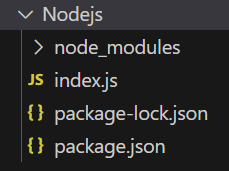Express JS express.json() Function
Last Updated :
25 Dec, 2023
The express.json() function is a built-in middleware function in Express. It parses incoming requests with JSON payloads and is based on body-parser.
Syntax:
express.json( [options] )
Parameters: The options parameter has various properties like inflate, limit, type, etc.
Return Value: It returns an Object.
Steps to Installation the express module:
Step 1: You can install this package by using this command.
npm install express
Step 2: After installing the express module, you can check your express version in the command prompt using the command.
npm version express
Step 3: After that, you can just create a folder and add a file, for example, index.js. To run this file you need to run the following command.
node index.js
Project Structure:

Project Structure
Example 1: Below is the code example of the express.json().
javascript
const express = require('express');
const app = express();
const PORT = 3000;
app.use(express.json());
app.post('/', function (req, res) {
console.log(req.body.name)
res.end();
})
app.listen(PORT, function (err) {
if (err) console.log(err);
console.log("Server listening on PORT", PORT);
});
|
Steps to run the program:
Step 1:Make sure you have installed the express module using the following command:
npm install express
Step 2: Run the index.js file using the below command:
node index.js
Output: Now make a POST request to http://localhost:3000/ with header set to ‘content-type: application/json’ and body {“name”:”GeeksforGeeks”}, then you will see the following output on your console:
Server listening on PORT 3000
GeeksforGeeks
Example 2: Below is the code example of the express.json().
javascript
const express = require('express');
const app = express();
const PORT = 3000;
app.post('/', function (req, res) {
console.log(req.body.name)
res.end();
})
app.listen(PORT, function (err) {
if (err) console.log(err);
console.log("Server listening on PORT", PORT);
});
|
Steps to run the program:
Step 2: Run the index.js file using the below command:
node index.js
Output: Now make a POST request to http://localhost:3000/ with header set to ‘content-type: application/json’ and body {“name”:”GeeksforGeeks”}, then you will see the following output on your console:
Server listening on PORT 3000
TypeError: Cannot read property 'name' of undefined
Share your thoughts in the comments
Please Login to comment...